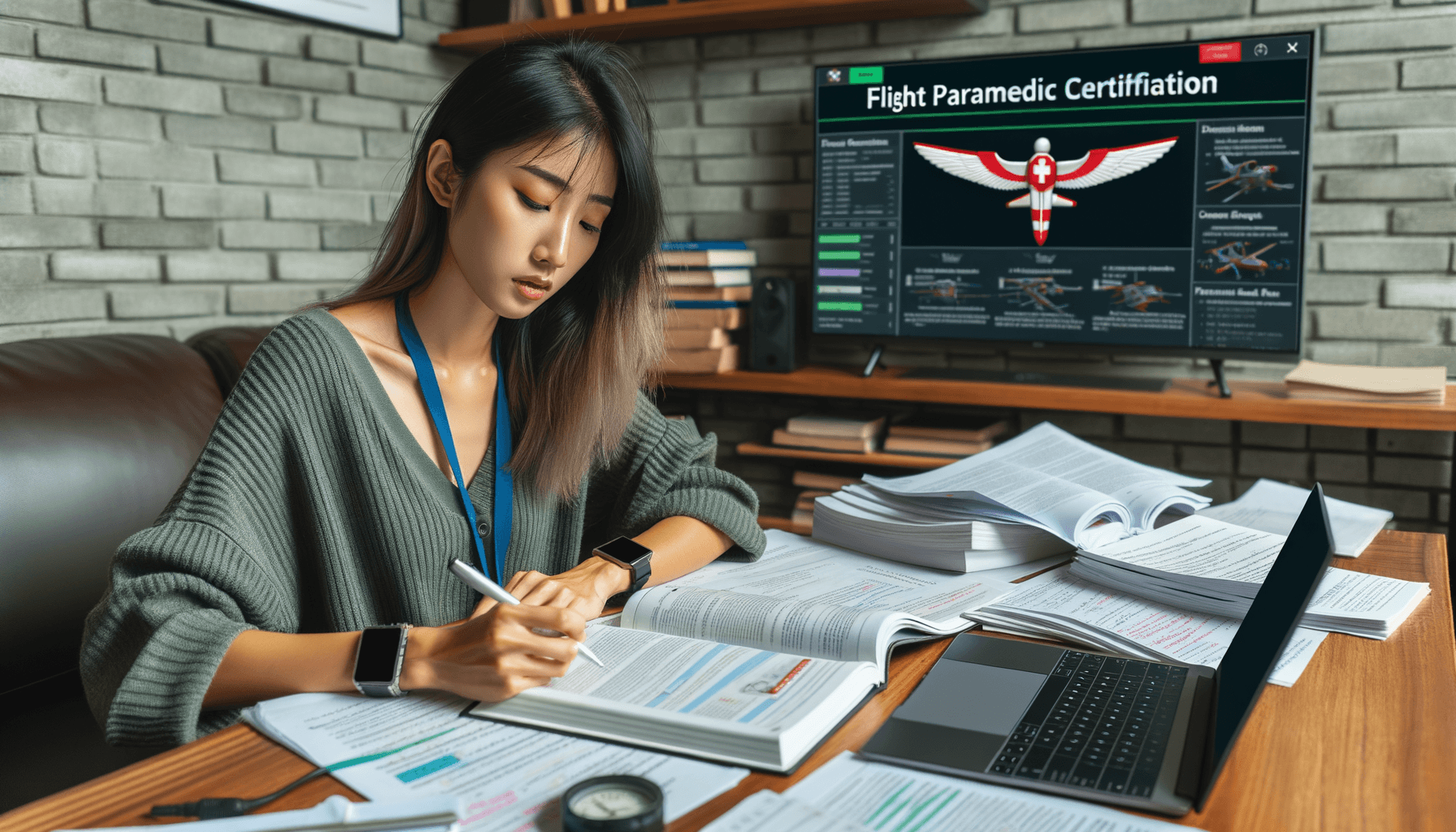
The Flight Paramedic-Certified (FP-C) credential is an esteemed certification that signifies advanced knowledge and skills in the field of flight and critical care transport medicine. This certification is designed for experienced paramedics who are seeking to specialize in the provision of medical care during air medical transports. The FP-C certification is recognized across various states and countries, underscoring its importance and the high level of competency it represents in the paramedic community.
To obtain the FP-C certification, candidates must undergo a rigorous examination process that tests their knowledge and skills in scenarios typical of flight and critical care environments. The exam includes 110 scored questions and 25 unscored questions, covering a wide range of topics relevant to air medical services. This comprehensive examination ensures that certified flight paramedics are equipped with the necessary expertise to handle complex medical situations in challenging environments. Preparation for this exam involves a deep dive into advanced clinical practices, flight physiology, and the operational aspects of critical care transport, making it a pivotal step for paramedics aiming to elevate their professional qualifications in specialized medical services.
Understanding the human body's structure and function is crucial for a flight paramedic. Topics covered include the cardiovascular, respiratory, neurological, gastrointestinal, musculoskeletal, and endocrine systems. Detailed knowledge of these systems helps in assessing and managing patients effectively during transport.
This section focuses on advanced airway management techniques, including the use of supraglottic devices, endotracheal intubation, and mechanical ventilation. Emphasis is placed on adapting these techniques to the confined and challenging environment of air medical services.
Comprehensive patient assessment skills are taught, focusing on both initial and ongoing evaluation. The curriculum covers trauma assessments, medical assessments, and special considerations for pediatric and geriatric patients in a flight setting.
The trauma module addresses the pathophysiology, assessment, and management of traumatic injuries. Specific topics include head injuries, spinal injuries, thoracic trauma, abdominal injuries, and limb trauma. The unique challenges of managing trauma patients in flight are also discussed.
Flight paramedics must be prepared to handle a wide range of medical emergencies. This part of the syllabus includes cardiology, neurology, endocrinology, toxicology, and environmental emergencies, with a focus on conditions that commonly require air medical transport.
This section deals with specific patient populations such as pediatric, obstetric, and neonatal patients. It also covers operational issues like safety protocols, flight physiology (including the effects of altitude), and legal/ethical considerations specific to the flight environment.
In-depth knowledge of pharmacology is essential for flight paramedics. This includes drug calculations, administration routes, drug interactions, and the use of emergency medications under stressful conditions.
Advanced procedures such as intraosseous access, central venous access, chest tube insertion, and pericardiocentesis are covered. Training focuses on performing these procedures safely in an airborne ambulance with limited space.
Effective communication skills are vital for coordinating with ground units, receiving hospitals, and within the air medical crew. This module also emphasizes accurate and efficient patient documentation under flight conditions.
Training includes not only medical care but also rescue operations which may be necessary in remote or inaccessible areas. Techniques for safe extraction and patient handling in challenging environments are taught.
Each topic is designed to equip candidates with the skills necessary to perform under the high-pressure conditions typical of medical emergencies in aerial environments.

The Flight Paramedic Certification (FP-C) exam is designed to evaluate the expertise of experienced paramedics in the flight and critical care transport environment. The examination format includes:
The unscored items are used for statistical purposes and to help develop future examinations. They do not affect the candidate's score.
The FP-C exam employs a criterion-referenced passing standard, where the passing score is set based on defined criteria rather than relative to the performance of other candidates. This standard ensures that every candidate is judged fairly and consistently.
If a candidate does not pass the FP-C exam, they are allowed to retake it. However, there are guidelines regarding the frequency of attempts:
The FP-C exam questions are multiple-choice, designed to test a candidate's knowledge and skills in areas relevant to flight paramedicine, including but not limited to:
These questions assess a candidate’s ability to apply critical thinking and problem-solving skills in complex scenarios typical of flight and critical care transport situations.
The FP-C examination is designed for experienced paramedics involved in flight and critical care transport. It includes 110 scored items and 25 unscored items, covering a broad spectrum of advanced medical knowledge and skills. Familiarize yourself with the exam's structure and the types of questions that will be asked. This information can typically be found in the FP-C Candidate Handbook.
Each topic requires a deep understanding of complex emergency scenarios that are specific to air and critical care transport settings.
Enroll in advanced courses that focus on the critical care aspects of paramedicine. Key areas include ACLS, PALS, NRP, and ITLS. These courses ensure you are up-to-date with the latest protocols and techniques.
Hands-on experience is crucial. Work closely with seasoned flight paramedics or participate in simulations that mimic emergency scenarios you might face during flights.
Purchase and complete practice tests available through official sources. These tests provide a good benchmark of your readiness and help identify areas where further study is needed.
Connect with peers who are also preparing for the FP-C exam. Sharing knowledge and discussing complex topics can enhance your understanding and provide new insights.
Set up a consistent schedule to review all topics. Frequent review sessions help retain information better and reduce the stress of last-minute cramming.
Keep abreast of any changes in clinical practice guidelines and protocols by regularly consulting trusted sources in the medical field, including updates from accreditation bodies like CAMTS.
By following these steps diligently, you can enhance your preparedness for the FP-C certification exam, ensuring a comprehensive grasp of both theoretical knowledge and practical skills required for success in this specialized field.

Practicing exam questions for the FP-C certification helps candidates become familiar with the structure and format of the actual test. Understanding how questions are phrased, the types of answers that are typically provided, and the layout can reduce test-day anxiety, allowing candidates to focus more on their responses rather than navigating the format.
Regular practice with exam questions enables candidates to identify areas where their knowledge may be lacking. This self-assessment leads to targeted studying, ensuring that time is spent efficiently by focusing on weaker areas that need reinforcement.
The FP-C exam allocates 2.5 hours for completion, which requires effective time management. Practicing with timed quizzes can help candidates learn to allocate their time appropriately across questions, ensuring that they can complete the exam within the allotted timeframe without rushing through sections.
Exam practice offers a practical application for theoretical knowledge gained through study. Candidates can see how their learning applies to real-world scenarios and case studies typically found in exam questions, bridging the gap between textbook learning and practical application.
The more familiar a candidate is with the types of questions asked in the FP-C exam and their own ability to answer them correctly, the more confident they will feel going into the actual test. Confidence plays a crucial role in reducing exam stress and improving overall performance.
Engaging with practice questions requires active participation from learners, promoting a deeper understanding and retention of information. This active engagement helps solidify knowledge and skills that are crucial for both passing the FP-C exam and performing effectively in real-life paramedic roles.
Many practice exams provide detailed explanations for each question, offering immediate feedback on performance. This feedback is vital for understanding mistakes and learning from them, which is an effective learning strategy for improving future performance.
By integrating regular practice sessions using past exam questions into their study routines, FP-C candidates can comprehensively prepare themselves to meet the rigorous demands of the certification examination and enhance their professional competence in critical care transport environments.
Find exam practice questions on exammaker.ai.
The International Board of Specialty Certification (IBSC) offers various resources for FP-C aspirants. One of the primary methods to access practice questions is through purchasing practice tests directly from the IBSC website. These practice tests are designed to mirror the actual exam format and content, providing a realistic simulation of the test environment.
Several online platforms provide specialized courses and practice questions tailored for the FP-C exam. These platforms often include video tutorials, module-based learning, and practice quizzes that help reinforce learning.
Certain textbooks and study guides are highly recommended by past candidates for their detailed coverage of FP-C topics. These books often come with end-of-chapter review questions or additional online resources where you can find practice questions.
Engaging with community forums and groups can be beneficial. Members often share their experiences, study tips, and sometimes post practice questions or mock exams which they’ve created or come across during their preparation.
By exploring these resources, candidates can access a wide range of FP-C exam practice questions that will aid in effective preparation for securing the certification.
The FP-C exam is designed to evaluate the expertise of experienced paramedics in the flight and critical care transport environment. Knowing the structure of the test can significantly impact your preparation strategy:
Utilize a variety of study materials to cover different aspects of the exam:
Hands-on experience is invaluable:
Using these strategies can help maximize your performance on the FP-C exam, leveraging both your knowledge and experience to achieve certification.

Preparing for the Flight Paramedic Certification (FP-C) exam requires a thorough understanding of critical care, air medical knowledge, and emergency response skills. Here are five practice exam questions that will help assess your readiness for the FP-C exam.
A 45-year-old male patient presents with severe chest pain and diaphoresis. His blood pressure is 90/60 mmHg, heart rate is 110 bpm, and he is pale and clammy. As a flight paramedic, what should be your first course of action?
During a transport, you encounter a patient with increasing respiratory distress who suddenly becomes unresponsive. Upon examination, you notice absent breath sounds in the left chest. What is the most likely diagnosis?
Which medication is indicated for the management of status epilepticus in a pre-hospital setting?
You are treating a patient with a suspected pelvic fracture following a motorcycle accident. The patient is hypotensive and tachycardic. Which of the following is the most appropriate intervention?
When transporting a patient with severe anaphylaxis, which of the following interventions should be prioritized?
These questions are designed to simulate the type of critical thinking and knowledge application required for success on the FP-C exam. Each question focuses on different aspects of flight paramedicine, ensuring comprehensive preparation across all necessary topics.
The Certified Flight Paramedic (FP-C) certification is a specialized credential aimed at paramedics who operate in flight and critical care transport settings. This certification validates the advanced knowledge and skills required beyond the scope of a traditional paramedic.
The FP-C examination consists of 135 questions, of which 110 are scored and 25 are unscored. Candidates have 2.5 hours to complete the exam. The questions are designed to assess mastery over critical care transport medicine, rather than entry-level paramedic knowledge.
The examination covers a variety of topics relevant to flight and critical care transport paramedicine. These include, but are not limited to, patient assessment, management of acute medical conditions, airway management, and pharmacology. Candidates are tested on their overall knowledge of transport medicine, not just the specifics of their current program.
The passing score for the FP-C exam is determined using a modified-Angoff method by a designated IBSC Subspecialty Board or Test Committee. The passing standard reflects a level of mastery required for certification and does not adhere to a fixed percentage pass rate.
Candidates can register for the FP-C exam online through the IBSC website. Upon registration, you will receive an eligibility number via email within 3-5 business days along with your scheduling information.
The FP-C exam is available at over 800 testing centers across the United States and nearly 100 international locations. You can find a list of testing centers on the IBSC website.
The examination fee varies depending on your membership status with IBSC:
If you do not pass the exam, you will receive a diagnostic report that highlights areas of strength and weakness. This report can be used to guide your study efforts should you choose to retake the exam.
Candidates who fail the exam have the option to retake it. It's advised to review the diagnostic report received upon failing to focus your preparation on identified weak areas before scheduling a retake.